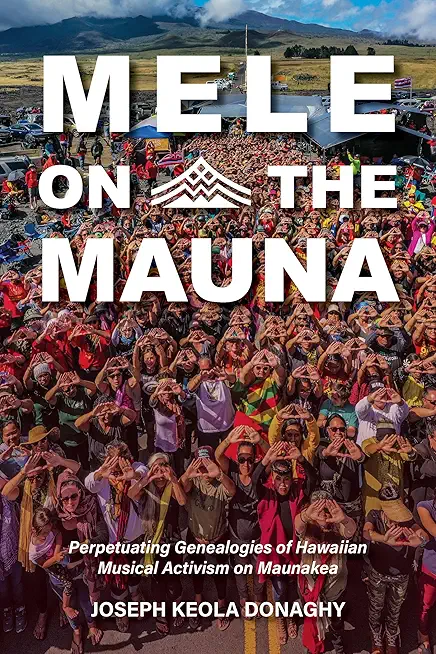
Donaghy, Joseph Keola
product information
description
kia'i, or protectors, made up of kānaka 'ōiwi (Native Hawaiians) and their allies came together to prevent the construction of the Thirty-Meter Telescope (TMT) on the dormant volcano Maunakea.
In Mele on the Mauna, Joseph Keola Donaghy explores how music, and especially haku mele, or Hawaiian language composers, played a crucial role in this defense. Musicians flocked to the mauna (mountain) to perform for the kia'i and a worldwide audience via social media. Haku mele created new songs at unprecedented levels, releasing many commercially with proceeds benefiting organizations providing support services and supplies to the kia'i. This book features over 30 of the author's interviews with individuals who participated in musical activities connected with this movement, including kia'i and their supporters, composers, musicians, and community leaders. Donaghy explores Indigenous Hawaiian concepts and theories like mana (power), mo'okū'auhau and pilina (genealogy and relationships), kapu aloha (philosophical code of conduct), and aloha 'āina (love of land, patriotism), and western academic concepts like connectedness and community building, poetics, sound(ing) and silenc(e/ing), conflict, and creativity.
Mele on the Mauna illuminates how music played a powerful role in building solidarity, inspiration, and activism, reveling in the most contentious confrontations about protecting Maunakea and the outpouring of musical performances and creativity that occurred.
In Mele on the Mauna, Joseph Keola Donaghy explores how music, and especially haku mele, or Hawaiian language composers, played a crucial role in this defense. Musicians flocked to the mauna (mountain) to perform for the kia'i and a worldwide audience via social media. Haku mele created new songs at unprecedented levels, releasing many commercially with proceeds benefiting organizations providing support services and supplies to the kia'i. This book features over 30 of the author's interviews with individuals who participated in musical activities connected with this movement, including kia'i and their supporters, composers, musicians, and community leaders. Donaghy explores Indigenous Hawaiian concepts and theories like mana (power), mo'okū'auhau and pilina (genealogy and relationships), kapu aloha (philosophical code of conduct), and aloha 'āina (love of land, patriotism), and western academic concepts like connectedness and community building, poetics, sound(ing) and silenc(e/ing), conflict, and creativity.
Mele on the Mauna illuminates how music played a powerful role in building solidarity, inspiration, and activism, reveling in the most contentious confrontations about protecting Maunakea and the outpouring of musical performances and creativity that occurred.
member goods
No member items were found under this heading.
listens & views

JOY OF PASSOVER: A FAMILY ...
by JOY OF PASSOVER: A FAMILY SEDER / VARIOUS
COMPACT DISCout of stock
$9.99

NOT JUST KNEE DEEP:RETROSPECTIVE OF ...
by NOT JUST KNEE DEEP:RETROSPECTIVE OF KNEE / VAR
COMPACT DISCout of stock
$21.99
Return Policy
All sales are final
Shipping
No special shipping considerations available.
Shipping fees determined at checkout.





